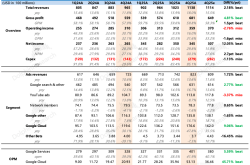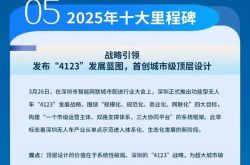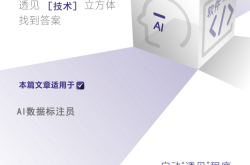Revisiting Manus: Beyond the Chinese Background
![]() 07/10 2025
07/10 2025
![]() 652
652

AI entrepreneurs must prioritize globalization from the outset.
Author | He Jian
Editor | Zhang Wen
Cover | Interstellar
AI startup Manus, which garnered significant buzz in domestic social media circles a few months ago, has announced layoffs. Reports indicate that Manus has terminated its Chinese business operations, with all but over 40 core technical personnel from the original domestic team of approximately 120 being laid off. The retained technical staff have been relocated to Singapore.
In its public response, Manus did not deny the layoffs, stating only that "based on the company's operational efficiency considerations, we have decided to adjust some business teams. The company will continue to focus on the development of our core business and enhance overall operational efficiency."
Following the domestic AI wave ignited by DeepSeek earlier this year, Manus was briefly hailed as another source of pride for China. However, it appears the company may not have initially targeted the domestic market. Despite its earliest R&D team being based in Beijing and Wuhan, it barely promoted on domestic platforms, except for inviting a select group of domestic tech enthusiasts to experience its products early on.
Its first promotional video was first released on overseas social media platforms such as YouTube and X, with the founder introducing the product in fluent English. The Manus promotional video that went viral on video platforms was not posted by the official account but rather on the personal video platform account of Zhang Tao, co-founder of the team, titled "Qianyun Thoughts." Its website was originally available only in English, without a Chinese version.
While Manus has also opened official accounts on domestic social media platforms like Douyin, Xiaohongshu, video platforms, and Weibo, it has never posted any updates. Only the video platform has shared a message about a strategic partnership with Alibaba's Tongyi Qianwen, while Douyin, Xiaohongshu, and Weibo remain inactive.
It's not that Manus undervalues social media promotion. For an AI application company aiming at C-end users, social media promotion is paramount. However, all of Manus's promotional efforts have been focused overseas. For instance, while it has never posted videos on Douyin, it has released nearly 80 short videos on TikTok and 33 promotional videos on YouTube in the past four months.
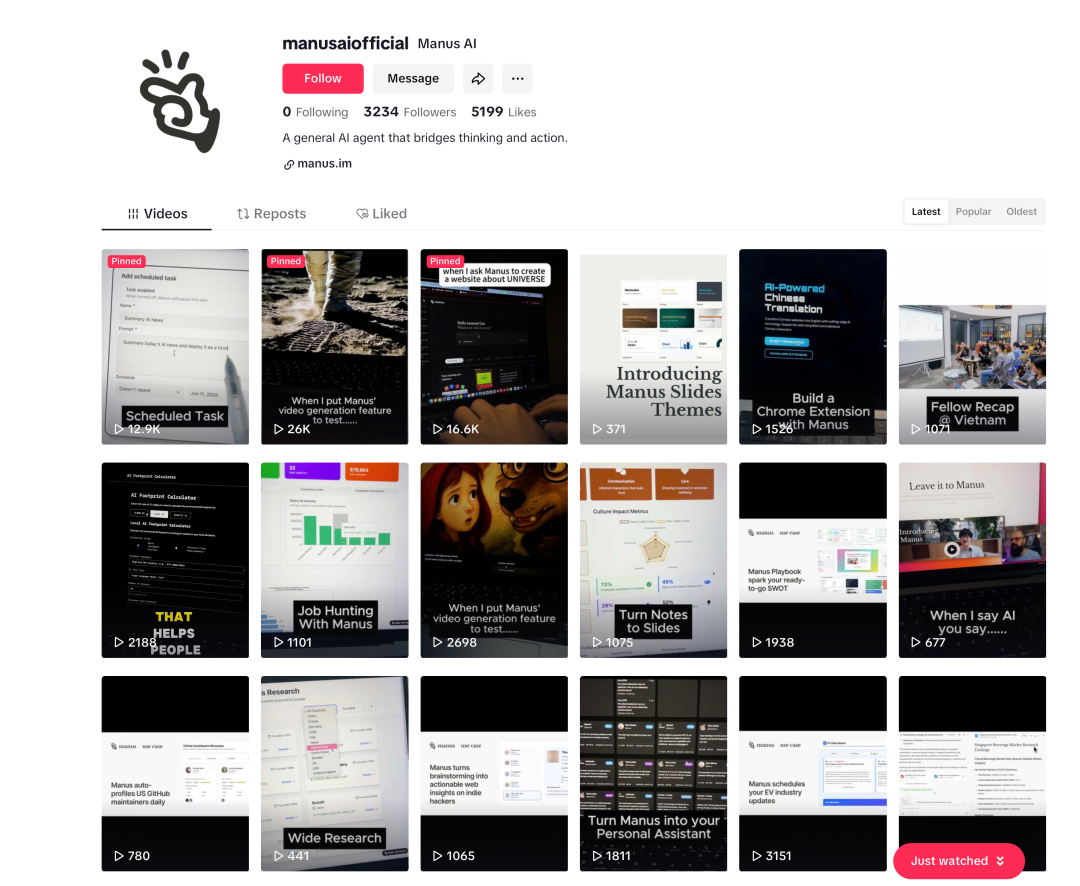
Manus's TikTok homepage
Even though domestic media coverage of Manus has far surpassed that of overseas media in recent months, the founding team has rarely appeared domestically. In March this year, rumors circulated that Xiao Hong, the founder of Manus, would participate in the 2025 NVIDIA Startup Showcase Wuhan event and deliver a public speech, but he ultimately did not attend.
The founding team spends more time overseas, engaging with foreign developers and conversing with tech leaders. For example, Ji Yichao, co-founder and chief scientist of Manus, recently had a conversation with Steve Chen, co-founder and CTO of YouTube. ZhenFund, an angel investor in Manus, published a transcript of the conversation on its official WeChat account titled "A Dialogue Between Two Generations of Startups."
Manus has also hosted numerous offline open events and recruited core users known as "Manus fellows" globally, but none of these events or recruitments have been held domestically; instead, they have taken place in overseas regions such as the United States, Japan, Singapore, Australia, and Saudi Arabia.
When Manus was first launched in early March, it created a frenzy of "one code being hard to come by," with Manus invitation codes selling for tens of thousands of yuan on second-hand trading platforms. However, if you now visit Manus's official website Manus.im, you will find it inaccessible, as their products and website are not registered in China. The previously registered Chinese domain Manus.cn is also unreachable.
Part of the reason may be related to the fact that Manus primarily uses overseas models as its model foundation. Previously, Manus collaborated with Tongyi Qianwen, announcing that the two parties would realize all functions of Manus on domestic models and computing power platforms based on the Tongyi Qianwen series of open-source models. However, no further news has emerged in recent months. The collaboration adds another layer of uncertainty following Manus's layoff of its domestic team. Alibaba did not respond to a request for comment from "Shan Shang."
Tech media have extensively discussed Manus's market choice, citing factors such as the poor domestic AI paid ecosystem, making it easier for Manus to acquire paid users overseas.
Overseas, ChatGPT has acquired over 20 million paid users with its $20 Plus membership, and media outlets predict that its annual revenue could reach $12.7 billion. In contrast, domestic Wenxin Yiyan was forced to cancel its paid service under the impact of DeepSeek.
Similarly relying on paid memberships, Aravind Srinivas, the founder of Perplexity AI, stated three months ago that Perplexity's annualized revenue has surpassed $100 million and that there is still significant room for monetization.
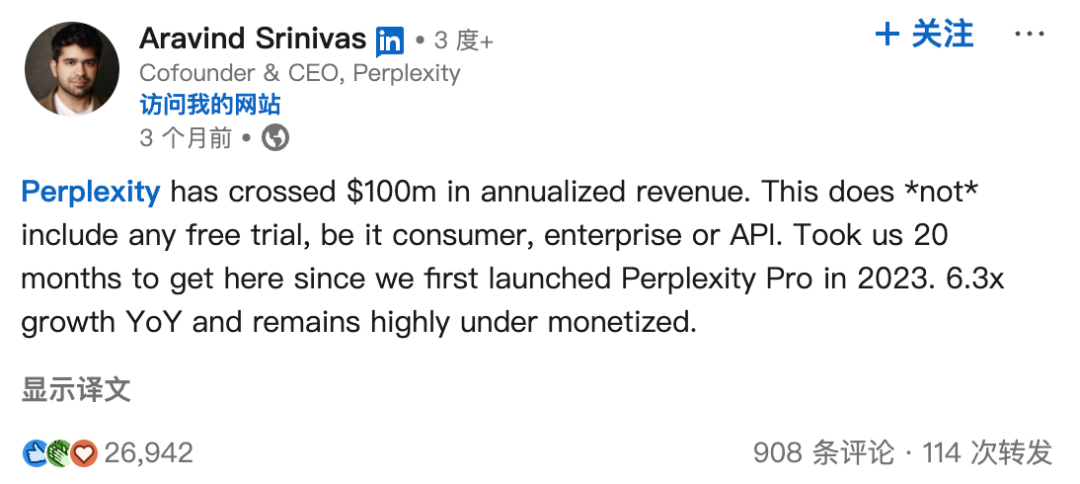
Aravind Srinivas's statement
The Manus official website currently lists three paid membership tiers: Basic, Plus, and Pro, with monthly fees of $19, $39, and $199 respectively, which are considered expensive for domestic users.
Domestic internet companies have also launched numerous general agent products similar to Manus, such as ByteDance's Kouzi and Baidu's Xinxiang. The overseas version of ByteDance's Kouzi has already announced paid prices, with three membership tiers priced at $9, $19, and $39 respectively. Compared to these financially robust internet giants, Manus struggles to match in terms of financial and material resources.
In recent days, with news of Manus's domestic layoffs spreading, media outlets have begun to emphasize that Manus has relocated its global headquarters to Singapore. However, it's challenging to say that this decision was made only in recent months. Manus's Singapore company, "Butterfly Effect," was registered as early as August of the previous year and has only recently begun formal operations. Now, on the Manus official website, it states, "Today, Manus's global headquarters is in Singapore."
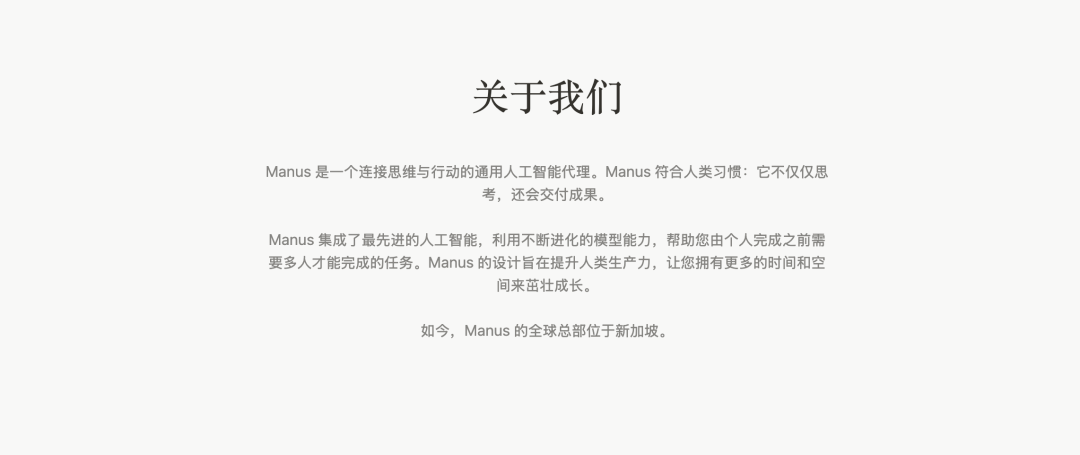
Introduction on Manus's official website
In June this year, Zhang Tao, co-founder of the company, spoke at the SuperAI conference held in Singapore, publicly stating that they are a company headquartered in Singapore with offices in Tokyo and California. He did not mention their offices in Beijing and Wuhan.
They are also actively recruiting, with Zhang Tao stating that they have many vacant positions and welcoming everyone to join. The Manus official website lists 21 job openings, with annual salaries exceeding one million yuan, but all these positions are located in Singapore.
When Manus first gained popularity, it faced significant criticism. Some believed that the company leveraged the rise of domestic AI sentiment sparked by DeepSeek, being hailed as the next "light of domestic products" and "pride of domestic AI" amidst waves of applause. However, in reality, it was a product primarily targeting overseas markets and users.
Nevertheless, this does not negate the application breakthroughs and paradigm innovations of Manus itself, which still represent the pride of Chinese AI entrepreneurs. Its parent company, Butterfly Effect, is still registered and operated in China. The "Science and Technology Innovation Board Daily" visited Manus's Wuhan office, where employees on site confirmed that the office was still operating normally.
Manus is not the first Chinese AI startup to establish its headquarters overseas. For example, AI video generation tool platform HeyGen relocated from Shenzhen to Los Angeles, and Jing Kun, former vice president of Baidu Group and CEO of Xiaodu Technology, chose to start a business in the United States from the outset. They have also continuously emphasized their global backgrounds. The same is true for internet companies that have successfully ventured overseas, such as ByteDance's TikTok, Pinduoduo's Temu, and Shein, whose official websites all indicate that their headquarters are overseas.
If in the mobile internet era, only ByteDance could be considered a truly global company, in the AI era, many entrepreneurs are determined to prioritize globalization from the outset. Investors are also eager to promote startups to go global. Deng Mingsheng, founder of Momentum Capital, recently said, "AI application startups are born global." He noted that, especially in the field of agents, there is an inherent ability to cross languages and scenarios. If global users are targeted from the outset, the product's upper limit will be higher, and the opportunities will be greater.
Compared to the overseas expansion of internet companies, AI entrepreneurs are more affected by geopolitical factors and have to face multiple constraints such as funding and computing power, forcing them to prioritize globalization earlier.
In April this year, foreign media reported that Butterfly Effect, the parent company of Manus, completed a new round of funding of $75 million led by renowned Silicon Valley venture capital firm Benchmark, with a post-investment valuation of nearly $500 million. Related reports stated that this investment was still under review by the U.S. Treasury Department. The United States has previously issued investment bans on China, particularly in the field of artificial intelligence.
Before launching Manus, Butterfly Effect's investors included Tencent, Sequoia China, and ZhenFund.

